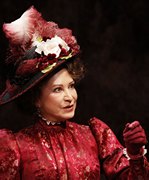SITE GUIDE
SEARCH
REVIEWS
REVIEW ARCHIVES
ADVERTISING AT CURTAINUP
FEATURES
NEWS
Etcetera and
Short Term Listings
LISTINGS
Broadway
Off-Broadway
NYC Restaurants
BOOKS and CDs
OTHER PLACES
Berkshires
London
California
New Jersey
DC
Connecticut
Philadelphia
Elsewhere
QUOTES
TKTS
PLAYWRIGHTS' ALBUMS
LETTERS TO EDITOR
FILM
LINKS
MISCELLANEOUS
Free Updates
Masthead
Writing for Us
A CurtainUp  London Review
London Review
 London Review
London ReviewMrs Warren's Profession
by John Thaxter
|
I always wanted to be a good woman. I tried honest work; and I was slave-driven until I cursed the day I ever heard of honest work. I was a good mother: and because I made my daughter a good woman she turns me out as if I was a leper. Oh, if only I had my life to live over again! — Mrs Warren
|

Felicity Kendall as Mrs Warren
(Photo: Nobby Clark) |
Financial success has also paid for her only daughter Vivie's education, a Cambridge bluestocking with sufficient resolve to reject her mother's money and condemn her for continuing in the evil enterprise. Rising star Lucy Briggs-Owen as Vivie, opens and closes the story, a journey from priggish academic, kicking her heels in a Surrey garden, to the Shavian "new woman", making her independent way in the world of law and insurance after discovering the source of her mother's wealth.
But Shaw's early play, seeing virtues in vice and the vice in Victorian virtues, was banned by the Lord Chamberlain for more than thirty years as "immoral and improper". Written in 1894 and first published as the third of his three Plays Unpleasant it was not staged until 1902 and then only at a private club performance. Worse, when performed in New York in 1905, the entire company was threatened with arrest for immorality.
Happily Michael Rudman's crisply detailed revival, matching telling action to the conversational exchanges, also discovers a world of emotion behind the words; notably Kendal's howls of pain and despair at two telling moments. And with a voice like a rasp she creates a powerful, sexy portrayal of the vital vulgarian with a dark secret; at one shocking moment boldly kissing an attractive young boy, Vivie's ardent suitor Frank, full on the lips as a bit of sexual education and passing it off as a "motherly kiss".
As written, the four male roles are merely foils to the central duo. But David Yelland as the creepy lecher Sir George Crofts, Mrs Warren's principal investor, swaggers dangerously with a knowing leer, hands thrust deep in the pockets of his carefully tailored trousers; while Max Bennett as the limber young Frank creates a generous stage presence, lifting several scenes with his youthful vitality, sharing a sustained romantic embrace with Briggs-Owen's otherwise ice-cold Vivie that looks like one of those Edwardian genre paintings of true love in a garden.
Good support comes from Mark Tandy as the debonair architect Praed, hovering on the edges of events while helping to unravel the plot, and Eric Carte as the bumbling Haslemere incumbent, once Mrs Warren's secret lover, whose indiscretions carry unexpected echoes across two decades.
Paul Farnsworth's sparse set designs were built for touring: the first three acts are backed by impressionist rustic gardens and a glimpse of Surrey hills on translucent sliding panels which, apart from downstage furniture, leave the rest to our imagination. But for the fourth act, with no happy ending, we get a realistic setting, an austere London law office that effectively transports us from Arcadia to urban practical politics and the harsh but inevitable resolve of Shaw's final scene.
|
Subscribe to our FREE email updates with a note from editor Elyse Sommer about additions to the website -- with main page hot links to the latest features posted at our numerous locations. To subscribe,
E-mail: esommer@curtainup.comesommer@curtainup.com
put SUBSCRIBE CURTAINUP EMAIL UPDATE in the subject line and your full name and email address in the body of the message -- if you can spare a minute, tell us how you came to CurtainUp and from what part of the country. |
| Mrs Warren's Profession
Written by George Bernard Shaw Directed by Michael Rudman Starring: Max Bennett, Lucy Briggs-Owen, Felicity Kendal, David Yelland With: Eric Carte and Mark Tandy Design: Design: Paul Farnsworth Lighting Designer: David Howe Sound: Jason Barnes Running time: Two hours 20 minutes with one interval Produced by Theatre Royal Bath Productions Box Office: 0870 060 6622 Booking to 19th June 2010 Reviewed by John Thaxter based on 25th March 2010 performance at the Comedy Theatre, Panton Street, London SW1Y 4DN (Tube: Piccadilly Circus) |
|
REVIEW FEEDBACK Highlight one of the responses below and click "copy" or"CTRL+C"
Paste the highlighted text into the subject line (CTRL+ V): Feel free to add detailed comments in the body of the email . . . also the names and emails of any friends to whom you'd like us to forward a copy of this review. |
|
London Theatre Tickets Lion King Tickets Billy Elliot Tickets Mighty Boosh Tickets Mamma Mia Tickets We Will Rock You Tickets Theatre Tickets |




